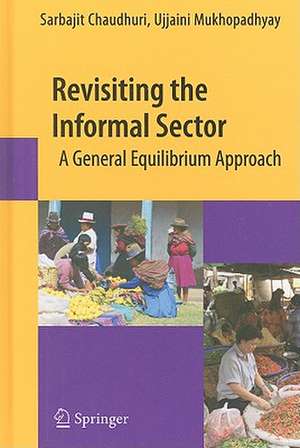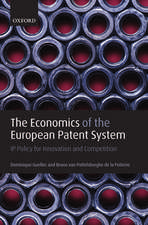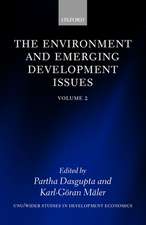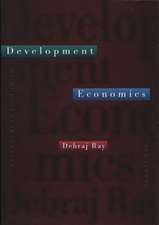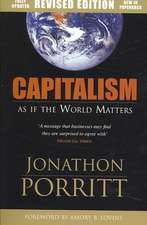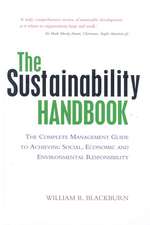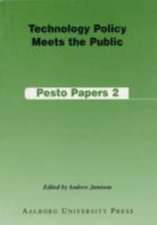Revisiting the Informal Sector: A General Equilibrium Approach
Autor Sarbajit Chaudhuri, Ujjaini Mukhopadhyayen Limba Engleză Hardback – 26 oct 2009
| Toate formatele și edițiile | Preț | Express |
|---|---|---|
| Paperback (1) | 638.57 lei 43-57 zile | |
| Springer – 9 sep 2014 | 638.57 lei 43-57 zile | |
| Hardback (1) | 644.82 lei 43-57 zile | |
| Springer – 26 oct 2009 | 644.82 lei 43-57 zile |
Preț: 644.82 lei
Preț vechi: 758.60 lei
-15% Nou
Puncte Express: 967
Preț estimativ în valută:
123.39€ • 129.15$ • 102.70£
123.39€ • 129.15$ • 102.70£
Carte tipărită la comandă
Livrare economică 31 martie-14 aprilie
Preluare comenzi: 021 569.72.76
Specificații
ISBN-13: 9781441911933
ISBN-10: 1441911936
Pagini: 243
Ilustrații: XIII, 243 p.
Dimensiuni: 155 x 235 x 16 mm
Greutate: 0.54 kg
Ediția:2010
Editura: Springer
Colecția Springer
Locul publicării:New York, NY, United States
ISBN-10: 1441911936
Pagini: 243
Ilustrații: XIII, 243 p.
Dimensiuni: 155 x 235 x 16 mm
Greutate: 0.54 kg
Ediția:2010
Editura: Springer
Colecția Springer
Locul publicării:New York, NY, United States
Public țintă
ResearchCuprins
Theoretical Foundations: A General Equilibrium Approach.- The Harris–Todaro Migration Model and Introduction of the Informal Sector.- Informal Sector and Open Unemployment.- Foreign Capital Inflow, Informal Sector and Welfare.- How and How Far to Liberalise a Developing Economy.- Economic Liberalisation, Informal Wage and Skilled–Unskilled Wage Inequality.- Incidence of Child Labour, Informal Sector and Economic Liberalisation.- Informal Sector, Pollution and Waste Management.- Conclusion and Comments.
Textul de pe ultima copertă
The last 50 years have seen unprecedented population growth and urbanization, particularly in developing countries. However, economic development in these countries has failed to generate adequate employment and income opportunities in the modern sector. This imbalance has compelled the surplus labor force to generate its own means of employment and survival in the informal sector. The informal sector is economic activity that is neither taxed nor monitored by a government. Its main characteristics are: easy entry for new enterprises, reliance on indigenous resources, family ownership of enterprises, small scale operations and low productivity, labor-intensive and adapted technology, reliance of workers on informal sources of education and skills, unregulated and competitive markets and lack of governmental support.
This timely, comprehensive book provides insight into the diverse aspects of the informal sector, its role in the context of unemployment, child labor, globalization and environment, as well as its multi-faceted interaction with the other sectors of the economy. It outlines previous doctrines that portray the informal sector as a sector of last resort, and elucidates newer approaches that see the informal sector as dynamic and instrumental in ameliorating unemployment and propelling the developing economies towards growth and prosperity. Finally, the book critically reviews the contradictions within both to trace the nature and direction of desirable policy parameters. It is an invaluable reference for academics and students in development and international economics. The book’s findings will also be useful to policymakers for application to development projects.
This timely, comprehensive book provides insight into the diverse aspects of the informal sector, its role in the context of unemployment, child labor, globalization and environment, as well as its multi-faceted interaction with the other sectors of the economy. It outlines previous doctrines that portray the informal sector as a sector of last resort, and elucidates newer approaches that see the informal sector as dynamic and instrumental in ameliorating unemployment and propelling the developing economies towards growth and prosperity. Finally, the book critically reviews the contradictions within both to trace the nature and direction of desirable policy parameters. It is an invaluable reference for academics and students in development and international economics. The book’s findings will also be useful to policymakers for application to development projects.
Caracteristici
Current economic climate fosters an increase in activity in the informal sector Most comprehensive book to theoretically address problems of informal sector Theoretical analysis offers formulation of appropriate policy prescriptions Includes supplementary material: sn.pub/extras
